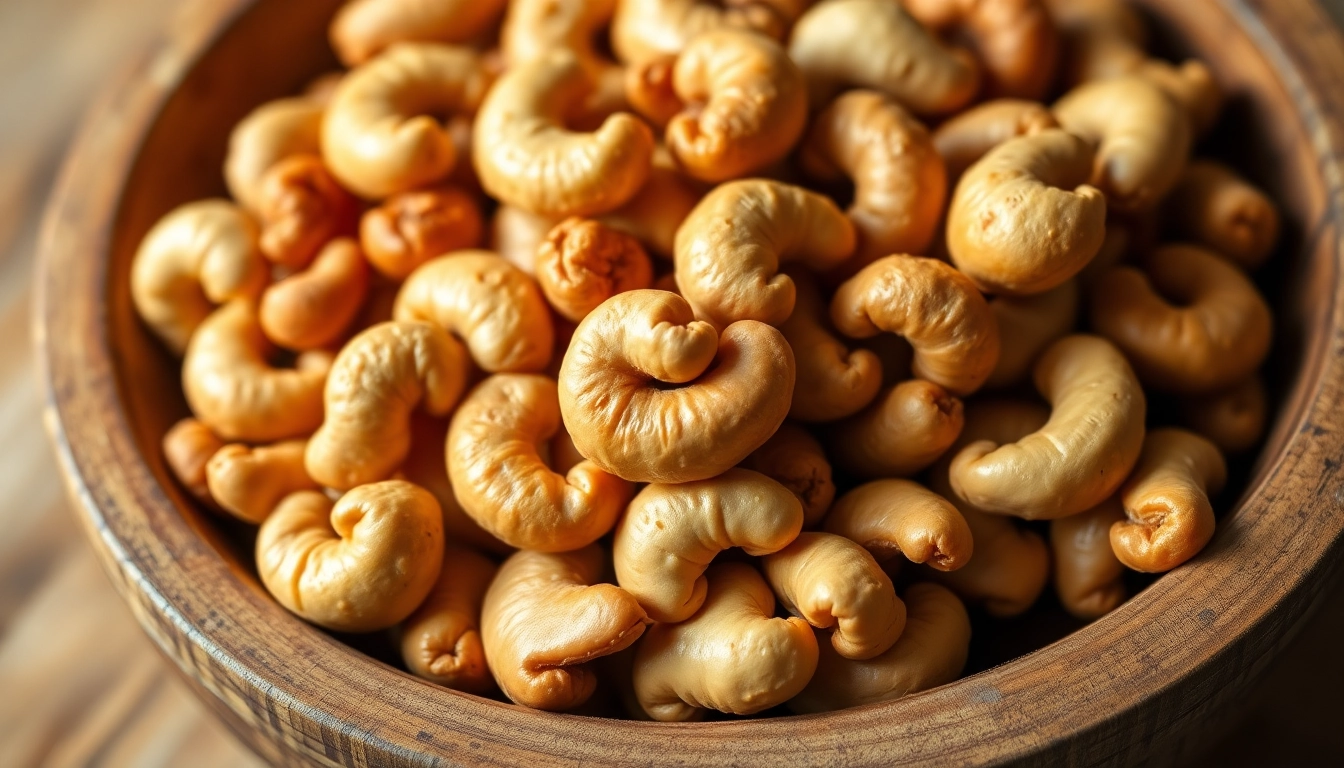
Understanding Cashew Nuts
What Are Cashew Nuts?
Cashew nuts, often simply referred to as cashews, are a type of seed sourced from the cashew tree, scientifically known as Anacardium occidentale. These unique seeds are harvested from the cashew apple, a fruit that is not only sweet and juicy but also valuable in its own right. While the cashew nut is typically characterized by its distinct kidney shape and creamy texture, its culinary versatility and health benefits make it a popular choice for consumers around the world. Often enjoyed as a snack or used in an array of dishes, cashew nuts are a rich source of nutrients, providing a delicious way to incorporate healthy fats and protein into one’s diet.
Origins and Growth of Cashew Nuts
The history of cashew nuts can be traced back to Brazil, where they were cultivated by indigenous populations for centuries. As Europeans began to colonize the Americas in the 16th century, they discovered the cashew’s extraordinary properties and quickly introduced them to other parts of the world, particularly India and Africa, where the favorable climate allowed for successful growth. Today, cashew trees thrive in diverse regions across tropical and subtropical climates, including Vietnam, Ivory Coast, and Brazil, with production peaking in the warmer months.
Botanical Classification: Nuts or Seeds?
Understanding whether cashews fall under the classification of nuts or seeds can be quite perplexing. Botanically speaking, cashews are actually seeds of the cashew apple, making them distinctly different from true nuts, which develop their edible portions from the ovary of a flower. Despite this classification, cashews have a culinary profile similar to true nuts, and thus they are commonly referred to as such in everyday language. Their rich flavor and texture make them a favored ingredient in both sweet and savory dishes.
Nutritional Profile of Cashew Nuts
Vitamins and Minerals in Cashew Nuts
Cashew nuts are not only delicious but also nutritionally dense. They contain an abundance of vitamins and minerals essential for maintaining overall health. One ounce (about 28 grams) of raw cashews provides approximately:
- 5 grams of protein
- 9 grams of carbohydrates
- 8 grams of fat, predominantly healthy monounsaturated fats
- 1 gram of dietary fiber
- 22% of the daily value (DV) for copper
- 20% of the DV for magnesium
- 18% of the DV for zinc
- 11% of the DV for phosphorus
- 10% of the DV for iron
These nutrients play critical roles in cellular function, immune support, and metabolic health.
Comparative Nutrition: Cashew Nuts vs. Other Nuts
When comparing cashew nuts to their counterparts, certain distinctions become clear. For example, while both almonds and walnuts are praised for their health benefits, cashews stand out due to their lower fat content and higher levels of certain minerals. Almonds, for instance, are particularly high in vitamin E, whereas walnuts are rich in omega-3 fatty acids.
Moreover, cashews possess a sweeter taste, making them a popular choice for desserts and sweet snacks. However, it’s important to consider the overall calorie and fat intake based on consumption, and moderation is key in weight management.
Calories in Cashew Nuts: What You Need to Know
Caloric content is an essential factor to consider when incorporating cashew nuts into your diet. One ounce of raw cashews contains approximately 157 calories. This seemingly modest number can quickly add up, especially when consumed in larger quantities. Therefore, portion control is crucial for those monitoring their caloric intake. Understanding the caloric density of cashews can guide better snack choices and meal planning while still allowing for the enjoyment of this delectable nut.
Health Benefits of Cashew Nuts
Heart Health and Cholesterol Management
Cashew nuts are particularly beneficial for cardiovascular health. The presence of monounsaturated fats can help lower bad cholesterol (LDL) levels while increasing good cholesterol (HDL), ultimately contributing to better heart health. Additionally, the high magnesium content in cashews aids in regulating blood pressure levels, reducing the risk of hypertension and other cardiovascular diseases.
Studies further suggest that incorporating cashews into a balanced diet may decrease inflammatory markers and improve overall heart function, emphasizing their role in maintaining cardiovascular wellness.
Potential Weight Management Aid
Although cashew nuts are high in calories owing to their fat content, they can be an ally in weight management when consumed thoughtfully. Their fiber and protein content promote a feeling of fullness, which can aid in curbing excessive snacking and overeating. Research indicates that snacking on nuts like cashews can contribute to weight control, as they provide satiety without excessive caloric intake when eaten in moderation. Including cashews in a balanced diet emphasizing whole foods may support sustainable weight management goals.
Benefits for Skin and Hair
Cashew nuts may also support skin and hair health, thanks to their rich content of antioxidants and healthy fats. The presence of copper helps in the production of melanin, a pigment responsible for skin and hair color, while the antioxidants can help combat free radical damage, promoting healthier skin. Regular consumption of cashews can lead to improved skin texture and hair vitality, making them an excellent addition to beauty-focused diets.
Culinary Uses of Cashew Nuts
Incorporating Cashew Nuts in Recipes
The culinary versatility of cashew nuts is one of their most appealing attributes. They can be effortlessly incorporated into salads, stir-fries, and baked goods. Whether roasted or raw, cashews provide a delightful crunch and a subtle sweetness that enhances both savory and sweet dishes. For example, they can be chopped and sprinkled over oatmeal or blended into sauces, adding creaminess and depth without the need for dairy products.
Moreover, adding cashew nuts to homemade trail mixes or energy bars can offer a healthy snack option, ensuring essential nutrients are easily accessible throughout the day.
Making Cashew Cheese and Milk
Cashew nuts are increasingly popular in vegan cuisines, particularly as a base for dairy alternatives. Making cashew cheese involves soaking raw cashews, blending them with nutritional yeast, lemon juice, and spices, resulting in a creamy, cheese-like spread that can be enjoyed on crackers or as a sandwich filling. Similarly, cashew milk is an easy and delicious dairy alternative, made by blending soaked cashews with water and straining the mixture for a smooth, creamy beverage.
These alternatives not only cater to dietary restrictions but also bring a rich flavor without the saturated fat and cholesterol found in traditional dairy products.
Snacking on Cashew Nuts: Tips and Ideas
When it comes to snacking, cashews offer a plethora of ideas for healthy enjoyment. They can be spiced and roasted for a savory twist or lightly sweetened with honey or maple syrup for a treat. Pairing cashew nuts with dried fruits creates a satisfying balance of flavors and nutrients, and using them as a topping on yogurt or smoothie bowls enhances the texture and protein content.
For those looking for portable snacks, packing individual servings of cashews can ensure an easy grab-and-go option that satisfies hunger and nourishes the body simultaneously.
Buying and Storing Cashew Nuts
Choosing Quality Cashew Nuts
Selecting high-quality cashew nuts is essential for enjoying their full flavor and health benefits. When purchasing cashews, look for products that are organic and non-GMO to ensure the absence of harmful chemicals. Additionally, check the packaging for freshness dates; whole, unbroken nuts typically indicate higher quality. If possible, buy cashews from reputable brands or health food stores to guarantee quality and trustworthiness.
Storage Tips for Freshness
Proper storage is crucial for maintaining the freshness of cashew nuts. To prolong their shelf life, store cashews in an airtight container, kept in a cool, dry place. For extended storage, consider refrigerating or freezing cashews, as this can significantly slow down rancidity and preserve their flavor and texture. Remember to allow frozen cashews to come to room temperature before use to retain their ideal consistency.
Where to Buy Cashew Nuts Online
Cashew nuts are widely available for purchase online, offering convenience and often competitive prices. Popular retailers such as Nuts.com and major platforms like Amazon provide vast selections of cashew varieties, catering to different taste preferences and dietary needs. Additionally, checking local health food store websites can yield organic and bulk purchasing options, providing a more sustainable choice.






